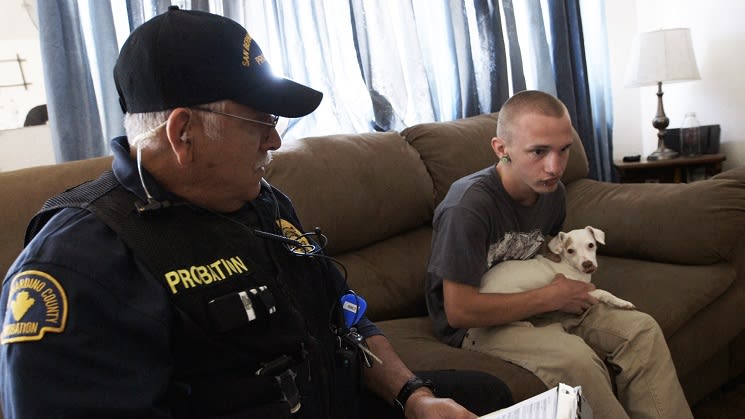Rising before the sun each day, Vonda Viland vigorously works out at 3:30 a.m. before heading to Black Rock High School where she works as principal. Sitting in an empty, dark office, she phones each of her students one by one, offering wake up calls with perky platitudes about how it's going to be another great day.
With her seemingly endless optimism and massive heart, Vonda is a real-life Tami Taylor. The kids in the Mojave Desert town of Yucca Valley face much worse problems than those of Friday Night Lights' Dillon, Texas, however. This documentary's titular "bad kids" are the victims of child abuse, sexual molestation, neglect, drug addiction and extreme poverty.
There's a feeling of hopelessness permeating the lives of Black Rock's students, and were they attending any other school that feeling would be accurate. These are the kids who normal teachers would rather suspend, their attention spans destroyed from troubled home lives and their self-confidence beaten out of them by the surrounding world. But Black Rock is a different sort of school — students work at their own pace, and they're given intense one-on-one attention so they can't hide in the back and slip through the cracks.
Because of its brutally real subject matter, The Bad Kids could have been another despairing documentary but frequent collaborators Keith Fulton and Lou Pepe (Lost in La Mancha, Brothers of the Head) have instead unearthed a story about human triumph in the face of adversity.
The film eschews traditional documentary methods to instead offer a warm and humanizing look at some broken young adults, forced to grow up early, who desperately want to break the cycle of poverty that they were born into. There are no statistics shown onscreen, just people — Joey, Jennifer, Lee, Layla, A.J. Adam, Caitlin and many others offer the filmmakers a deep and intimate look into their lives.
As we're guided through a whirlwind of shattered self-esteem and teen pregnancy, the film stays anchored in Vonda's can-do attitude, which appears to be motivated by a genuine love for the people she shepherds. Her door is always open to her students (one of many hokey signs in her office reads, "The witch is in"), and at her desk we watch her genuinely celebrate her students' achievements while mourning others mistakes.
When a Black Rock student graduates, Vonda makes an announcement on the intercom. She then puts a gown on that student, and they walk down the school's shabby hallways as everyone steps out of their class and cheers them on. Tears of pride stream down everyone's face, the audience included.
It's scenes like these that make The Bad Kids a genuinely uplifting documentary, and that wasn't just a trick pulled off in the editing room. Fulton and Pepe have uncovered a group of people who are actually, genuinely making a positive difference in the world and told their story with as little intrusion as possible. The Bad Kids might be rooted in harsh realities, but it's a film abounding in warmth, love and empathy.
With her seemingly endless optimism and massive heart, Vonda is a real-life Tami Taylor. The kids in the Mojave Desert town of Yucca Valley face much worse problems than those of Friday Night Lights' Dillon, Texas, however. This documentary's titular "bad kids" are the victims of child abuse, sexual molestation, neglect, drug addiction and extreme poverty.
There's a feeling of hopelessness permeating the lives of Black Rock's students, and were they attending any other school that feeling would be accurate. These are the kids who normal teachers would rather suspend, their attention spans destroyed from troubled home lives and their self-confidence beaten out of them by the surrounding world. But Black Rock is a different sort of school — students work at their own pace, and they're given intense one-on-one attention so they can't hide in the back and slip through the cracks.
Because of its brutally real subject matter, The Bad Kids could have been another despairing documentary but frequent collaborators Keith Fulton and Lou Pepe (Lost in La Mancha, Brothers of the Head) have instead unearthed a story about human triumph in the face of adversity.
The film eschews traditional documentary methods to instead offer a warm and humanizing look at some broken young adults, forced to grow up early, who desperately want to break the cycle of poverty that they were born into. There are no statistics shown onscreen, just people — Joey, Jennifer, Lee, Layla, A.J. Adam, Caitlin and many others offer the filmmakers a deep and intimate look into their lives.
As we're guided through a whirlwind of shattered self-esteem and teen pregnancy, the film stays anchored in Vonda's can-do attitude, which appears to be motivated by a genuine love for the people she shepherds. Her door is always open to her students (one of many hokey signs in her office reads, "The witch is in"), and at her desk we watch her genuinely celebrate her students' achievements while mourning others mistakes.
When a Black Rock student graduates, Vonda makes an announcement on the intercom. She then puts a gown on that student, and they walk down the school's shabby hallways as everyone steps out of their class and cheers them on. Tears of pride stream down everyone's face, the audience included.
It's scenes like these that make The Bad Kids a genuinely uplifting documentary, and that wasn't just a trick pulled off in the editing room. Fulton and Pepe have uncovered a group of people who are actually, genuinely making a positive difference in the world and told their story with as little intrusion as possible. The Bad Kids might be rooted in harsh realities, but it's a film abounding in warmth, love and empathy.
